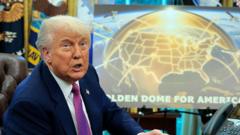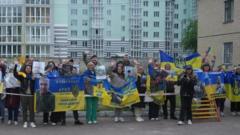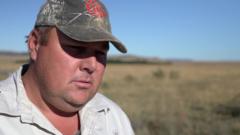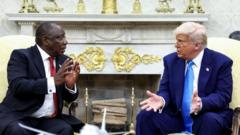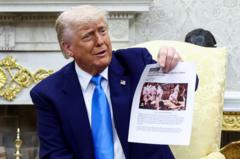Despite brutal exchanges with Trump, President Cyril Ramaphosa may capitalize on emerging domestic support as he navigates a tumultuous political landscape back home. While faced with coalition challenges and growing political factions, his composed demeanor during international diplomatic scrutiny reminds South Africans of his value as a stabilizing leader.
Ramaphosa's Diplomatic Resilience in Trump Showdown: Home Advantage or Political Gamble?

Ramaphosa's Diplomatic Resilience in Trump Showdown: Home Advantage or Political Gamble?
Cyril Ramaphosa faced a heated confrontation with Donald Trump, igniting debates on domestic pressures and coalition politics in South Africa, but revealing new opportunities for the President.
South African President Cyril Ramaphosa traveled to Washington this week seeking to improve relations following months of tension between his administration and former President Donald Trump. However, he was met with a high-stakes confrontation marked by Trump's accusatory rhetoric regarding a supposed white genocide in South Africa. The meeting turned into a public spectacle, watched by millions, putting Ramaphosa's diplomatic skills on display.
Despite criticisms from some quarters about his inability to counter Trump more aggressively, many praised Ramaphosa for maintaining his composure. Back home, however, he faces mounting challenges from the African National Congress (ANC), which is still reeling from previous election disappointments and an uneasy power-sharing arrangement with ten other parties. This coalition, formed to alleviate disarray, has often struggled with contentious issues surrounding land reform and fiscal policy, leading to political instability and potential implosion.
The economic situation in South Africa looms large over Ramaphosa's presidency. With rampant crime, corruption, and failing public services, his administration’s effectiveness is under scrutiny. Moreover, internal conflicts within the ANC intensify as factions prepare for the critical elections in 2027, with the power dynamics becoming more precarious.
Ramaphosa viewed this Washington visit as an opportunity to secure crucial trade agreements that could stimulate South Africa's ailing economy, particularly given the threatened renewal of the African Growth and Opportunity Act (AGOA), which had provided duty-free access to the U.S. market for select South African goods. However, Trump's inflammatory claims overshadowed these economic discussions.
There remains a potential silver lining for Ramaphosa. His conduct during the meeting highlighted his diplomatic experience, evoking memories of his key role in South Africa's transition from apartheid. His demeanor served to reinforce his reputation as a steady leader in turbulent times, even as domestic opponents, such as Julius Malema and Jacob Zuma, grow increasingly vociferous.
Political analysts note that while Ramaphosa has faced significant challenges, he could see an uptick in support for his leadership following the recent international exposure. His ability to handle complex, high-pressure situations instills a sense of reassurance among citizens who value stability amidst turmoil.
Some analysts believe the dramatic interaction with Trump may bolster the image of the coalition government in South Africa. The presence of different parties, including economically empowered allies like the Democratic Alliance, lends credibility to Ramaphosa's stance against Trump's claims and strengthens the governance narrative.
As the dust settles from this notable political theater, Ramaphosa must strategically position himself within the shifting political landscape back home, where both supporters and detractors are watching closely. While he navigates turbulent waters, his diplomatic efforts on the global stage and their response back home may define his administration's future trajectory.


